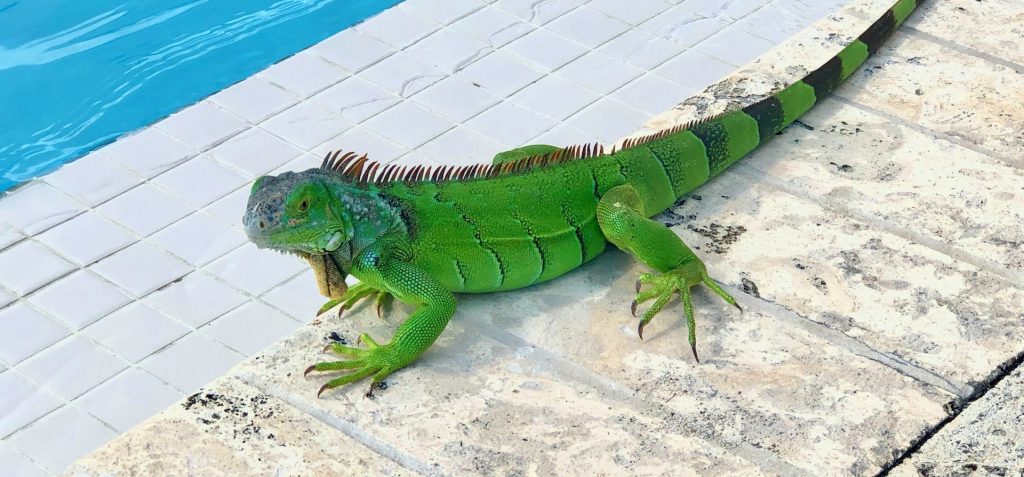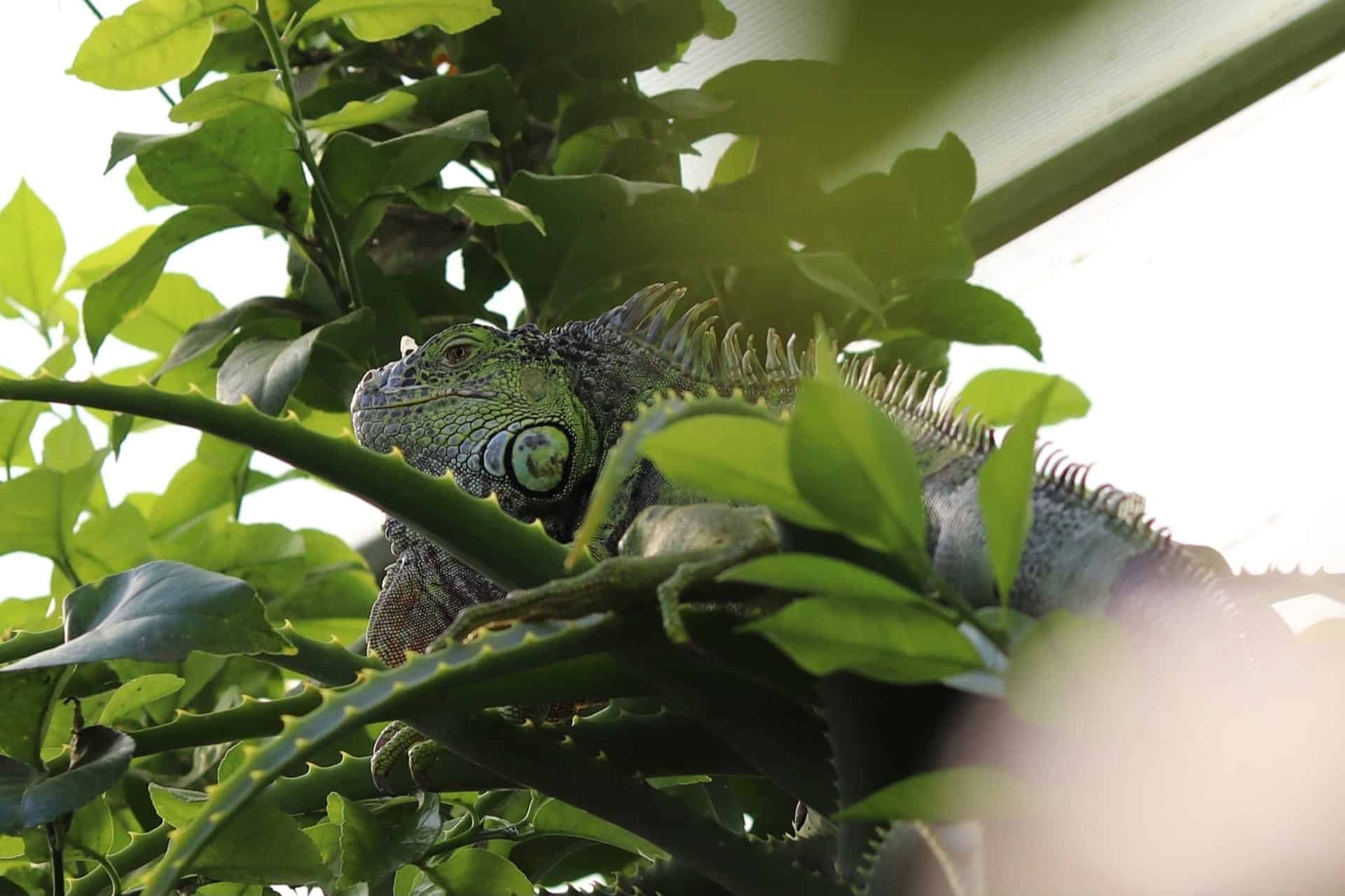Iguanas may not originally be from Florida but has made itself quite at home here – yes, we are talking about the iguana. These reptilian critters are escapees from the pet trade and have since thrived in the warm weather, much to the dismay of local residents. Today, hatchling iguanas are a growing concern across the Sunshine State for many reasons, one of which is that their poop can be toxic to humans and pets.
Research has shown that iguana feces can contain many harmful bacteria, posing a real risk to human health. So, what you might think looks like a small dog’s waste near your swimming pool or patio, may be an iguana’s feces that can make you sick. Continue reading if you are not sure what it looks like and how it can affect you.
Is Iguana Poop Harmful?
An iguana’s poop, like the droppings of many animals, can be dangerous to humans and pets, largely because of all kinds of bacteria and parasites in it:
- Salmonella: Iguanas are well known carriers of Salmonellosis (an infection caused by salmonella bacteria), which they can pass through their feces or saliva. This is the same bacteria typically associated with food poisoning. It can cause symptoms like diarrhea, fever, and stomach cramps in humans; this is particularly risky for kids and the elderly, whose immune systems are not as strong. Dogs that might sniff or eat the droppings, can also get sick.
- E. coli: Escherichia coli, commonly known as E. coli, is a type of bacteria that can be found in the digestive systems of animals, including iguanas. While many strains are harmless, some can cause serious illness in humans, leading to symptoms like severe stomach cramps, vomiting, and bloody diarrhea.
- Parasites: Diseases carried by iguanas include those caused by intestinal parasites, such as hookworms, roundworms, or protozoa. When transmitted to humans or pets, they can cause skin irritations, gastrointestinal problems, and other health issues.
It is not just direct contact with the fecal pellet that can be detrimental to your wellbeing. If you touch water, soil or any surface that has been contaminated, you can be at risk. For some sensitive people, breathing in particles from dried iguanas’ poop could trigger allergic reactions or asthma as well.
What Does Iguana Poop Look Like?
Identifying iguana dropping is simple once you know what to look for:
Size and shape
They are usually quite large when compared to what you might expect from smaller lizards. They are elongated and may have a slight curve. The size can vary, but they can be several inches long.
Color
It can range from dark green to dark brown in color. The exact shade depends on the iguana’s diet. If they have been eating lots of green leafy vegetables, you will see more of the green feces. Sometimes, the fecal mass can turn from brown to black when dried.
Texture
Iguana feces can be somewhat soft and squishy. Unlike bird droppings, which are more liquid, healthy iguana poops are more solid, resembling that of a small mammal.
Content
Sometimes, you can see undigested bits of food in the droppings, like pieces of leaves, fruits, or flowers, depending on what the iguanas eat.
Frequency and location
Adult iguanas are creatures of habit. If you find droppings in the same place repeatedly, it is likely an iguana’s favorite spot. They like to defecate near sunbathing spots or in their territory.
White tip or urate
Like many reptiles, iguanas excrete uric acid (urate) along with their feces. This can look like a white or chalky tip or segment in the droppings (which could be brown or black in color).

Most Common Hotspots for Iguana Droppings: A Guide for Florida Home and Business Owners
These invasive lizards are not very choosy when it comes to their nesting spots and places to leave droppings, so you might find them in residential or industrial settings:
- Gardens and yards: They prefer to nest in shrubbery, under bushes, or in flower beds. They are herbivores, so gardens are attractive to them.
- Trees: They like trees with dense foliage; iguanas are excellent climbers and love basking on tree branches.
- Patios and decks: On sunny days, you are likely to find green iguanas sunning on these areas.
- Swimming pools: Iguanas are partial to pools, not just for a dip but also as a warm perch.
- Roofs and attics: Iguanas can climb onto roofs or find their way into attics in search of warmth or shelter.
- Near water bodies: If your home is near a canal, pond, or any body of water, these areas can be prime spots for them to hang out.
- Storage yards: If there are any outdoor storage areas that are not frequently disturbed, they can become iguana nesting spots.
- Warehouses: It is not uncommon for them to find their way into secluded corners of a large warehouse.
- Under buildings: Any space beneath buildings or large structures can be a potential nesting area, especially if it is quiet and undisturbed.
- Drainage systems: The green iguana may be using your drainage systems or sewers to move around or as a refuge.
Make sure to inspect these areas regularly to identify early signs of green iguanas before they become a bigger issue. If you suspect an infestation, it is worth getting a professional assessment to manage the situation effectively.
Eliminate the Risks of Iguana Poop: Expert Iguana Removal is at Your Service
Discovering iguana droppings around your property is more than an eyesore, it can indicate a larger issue at hand. Where there are droppings, there are iguanas. And where there are iguanas, there is a need for professional intervention.
At Iguana Control – South Florida, the state’s largest iguana removal and control services, our team has a keen eye for detail and an arsenal of effective solutions to tackle the challenge. From identifying nesting sites to implementing preventive measures, we take every step to safeguard your space. If you have seen an iguana or its unsightly leftovers anywhere near you, give us a call at (954) 588-3188 or complete this form to schedule a site visit.


